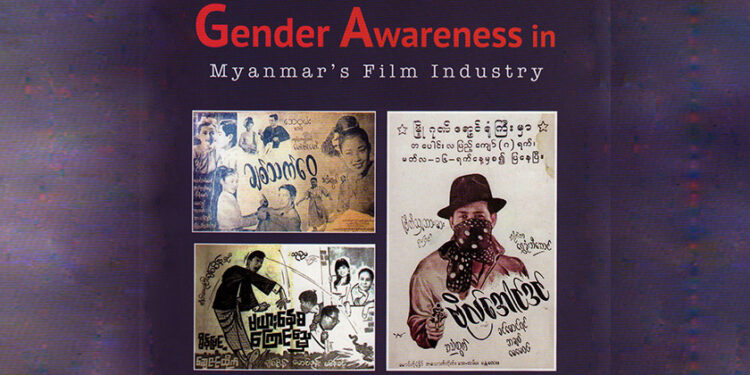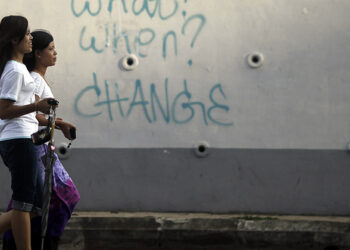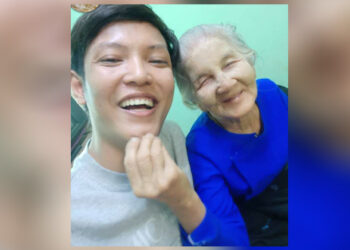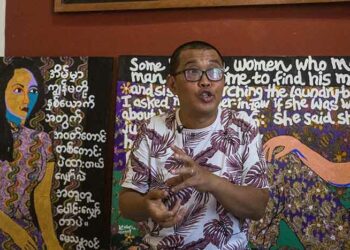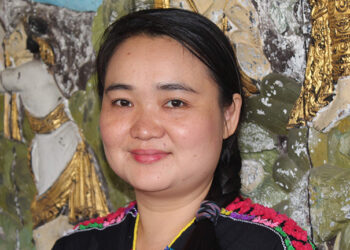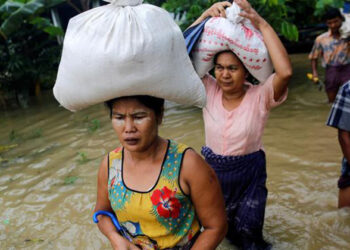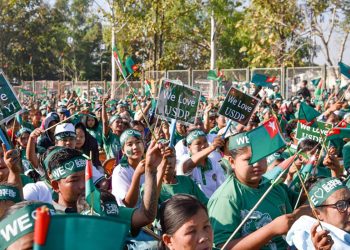YANGON–Stereotyping, gender roles and gender discrimination in films have been increasing in the Myanmar film industry, which plays an influential role in people’s thoughts and behavior, according to those behind research into gender awareness in Myanmar’s film industry.
“We have seen derogatory representations of the role of women, minority ethnic [groups] and LGBT in Myanmar films. The characters in the films are making fun of these groups. Even though it may be unintentional, it is happening at every second. It is offensive and it is a shame,” said Daw Myat Thet Thitsar, director of the Enlightened Myanmar Research Foundation (EMReF).
Recognized as one of the most powerful communication tools, with the ability to convey messages and images of social reality to audiences, Myanmar films are also being used as a propaganda tool to portray political history, transition and ideological conflicts.
Since the year 2000, one-third of the films created have been comedies and most of them contain sex jokes and insinuation of sexual harassment, said the researchers.
It will soon be one hundred years since the inception of Myanmar’s film production industry, but sadly the presentation and the characters have become “distorted” since the year 2000, said Daw Grace Swe Zin Htike, a member of the Myanmar film censorship board, who encourages research in the development of Myanmar films.
She added that advancements in the industry are sometimes off-track as the creative art of film-making becomes more like a factory-produced entity to serve commercial purposes. She hopes that the development of film schools and collaborations between the mainstream and independent filmmakers will help the industry to regain quality in films.
“The perceptions [of the creators] have been wrong but it should not be turned to poison,” Daw Grace Swe Zin Htike added, raising concerns that the characters in the films are very influential on the audience who tend to take cues from films for how they live with reality in their own lives.
She added that how the current Myanmar films represent male, female and LGBT characters, often involves discriminatory messages and portrays a biased identity. For example, LGBT characters are often portrayed as idiotic, rude and lustful.
“The quality of the films has decreased since the creative industry has being commercialized, but there are people who disagree with me who point out that the number of the films [produced] is increasing,” said Daw Grace Swe Zin Htike.
The researchers based their analysis on 83 Myanmar films of different genres produced in 2016 and 2017, looking out for cases of gender discrimination, stereotyping, gender-based violence and gender awareness. The research also involved discussions with mainstream and documentary film directors, scriptwriters, actors, actresses and members of the censorship board.
Of the total number, 36 films included cases of gender discrimination which devalue the abilities of female and LGBT characters, said Daw Aye Lae Tun, a leading researcher from EMReF.
The findings also reveal more challenges facing the film industry, which has an actor-oriented market. In order to stick to the low budgets, plots with have many holes and there is a declining number of cinemas where the films may be screened.
One male director quoted in the research said, “The creation of well-organized stories has been in decline. The script is sometimes written on the scene, as it has not been well prepared beforehand. If the actor requests for the script to be revised, the writer has to rewrite it. If needed, LGBT characters have to be used to support the role of the actor or to [add fun to] the plot.”
“Human rights were not heard of for a long time,” said Daw Aye Lae Tun as explanation for creators such as directors and scriptwriters treating ethical issues with ignorance. “A human rights-based approach should be applied as a mainstream approach to every issue—this is not only related to the military’s oppression,” she said.
Scriptwriters may unintentionally compose the dialogue in a biased way, but these research findings which are available for everyone to read, should draw attention to the issues, said Daw Swe Zin Htike. “We just need to correct them as soon as we realize the wrongdoings.”
The report findings may face opposition in the patriarchal society with some expressing their desire for Myanmar films to portray female characters as traditional women who are modest and take only the role of the house wife—the “perfect women”—in order to maintain a Myanmar-specific cultural perspective. The researchers, however, urged for only positive traditional views of women to be portrayed. The reality that modern Myanmar women often are opinionated, educated and have successful careers or businesses and healthy social lives should not be avoided.
“The research is comprehensive and the researchers did a detailed study on the films that are using proverbs to construct gender perspectives,” said Dr. Khin Mar Mar Kyi, an award-winning social anthropologist and the first Senior Burmese female academic at the University of Oxford, who joined the research-study launch.


